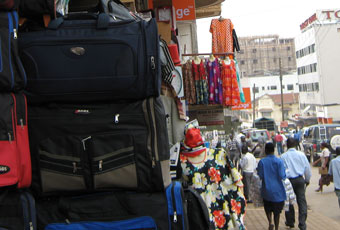
By Patrick Kagenda
UNBS, URA to integrate systems by end of year
Uganda has 52 gazetted entry points for imports but only 19 are monitored for quality of goods by the Uganda National Bureau of Standards (UNBS).
Smugglers know this. Result: Counterfeits and fake goods, especially electrical appliances, cables, cosmetics, human and animal drugs and foods flow into the country unabated.
Almost anything can be imported into the country as long as it meets the most minimum standards because licenses are easy to get and Uganda has no consumer protection law.
Unfortunately instead of working on a coordinated crackdown, the two government bodies supposed to block the importation of sub-standard goods – UNBS and the Uganda Revenue Authority (URA) ‘” have until now preferred the blame game. They have blamed each other, the lack of capacity, and each other’s system.
UNBS Executive Director Terry Kahuma blames a ‘capacity problem on the part of UNBS’.
Related Story: Cabinet debating law on counterfeits ‘” UNBS boss
UNBS not only lack man power but also lack modern monitoring equipment.
Meanwhile, helpless local manufacturers have continued to lament that not much can be done without a law in place.
‘We need a law with strong penalties that can bankrupt the counterfeiters,’ says Gideon Badagawa, the executive director of the Uganda Manufacturers Association (UMA). He recommends a penalty that charges a counterfeiter five times the value of the good he has counterfeited.
‘Government should know that the problem of unemployment is a result of counterfeits because they are cheap, they create no jobs locally and are responsible for knocking out genuine businesses regardless of UNBS and URA`s weaknesses,’ Badagawa says, ‘Without a law in place even the most equipped institution will fail.’
But all that could change soon.
The head of the imports department at UNBS Gyavira Musoke says the ‘current risk management system used by the URA is used internationally to ensure balance in trade vis- avis revenue. However the way it is done in Uganda leaves out the issue of standards’.
Gyavira Musoke says UNBS wants risk management needs to be reinforced and incorporated with profiles regarding standards to have an efficient risks management.
Currently it is a stand alone with URA doing only tax and UNBS doing standards. ‘It is a problem in the developing countries,’ says Gyavira. ‘However we are looking at the integration of both systems. UNBS appreciates the corporation with URA and we are looking at a pre-import conformity to standards that will enhance the green lane of the URA as goods will have been inspected at port of origin. This is due to start at the end of this year.’
UNBS says under the current system URA ignores quality issues because it is ‘only interested in tax collections to meet its target without looking at what it is taxing’.
URA has also been criticised for segregating incoming goods basing on ‘tax lanes’. Goods that pass through the green lane established for the efficient tax payers (but really end up being used by those lucky to have with close connections to the powerful in government) are never inspected; yellow lane goods are inspected at the discretion of the tax officers who may decide to verify the goods or not and the red lane is the compulsory lane that UNBS has to inspect because it is for the ordinary importers.
But URA assistant commissioner for Public and Corporate Affairs, Sarah Birungi Banage, defends the lanes system.
‘You can’t check container after container,’ she says, ‘We check the papers and only the goods classified as red lane goods are physically checked. However we permanently monitor all the importers and some times they fall from the green lane to the red lane because of our continued monitoring. We work hand in hand with UNBS at all our entry points where they have their staff.’
Issa Ssekkito, the spokesperson of the Kampala City Traders Association (KACITA) the umbrella body for the city traders blames both UNBS and URA.
‘UNBS should check all the goods as per its mandate of insuring quality and standards. Besides the goods going through the green lane are charged according to the invoice value yet we in the red lane are subjected to rigorous checks and made to pay high taxes,’ he says.
UNBS’s Kahuma says the government is now aware and appreciating the efforts of the regulatory body.
‘Government is responding by increasing funding,’ he says.
Hopefully, this will end the blame game and help URA and UNBS tackle the increasing substandard goods by enacting tougher regulation and commercial laws to scare away the fakers.
 The Independent Uganda: You get the Truth we Pay the Price
The Independent Uganda: You get the Truth we Pay the Price





